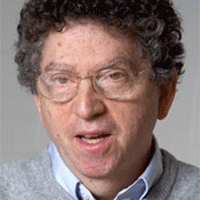
tducas@wellesley.edu
Faculty emeritus
B.A., Yale University; Ph.D., Massachusetts Institute of Technology
Science Center 386
Theodore W. Ducas
Professor Emeritus of PhysicsProjects include: video history of physics, developing touch opportunities for the visually impaired, motivated math education.
Since my retirement in 2018, I have been working on a number of projects. One project involves digitizing videos of talks by prominent physicists and making them available to the public. These talks (given in the 1970s) were organized with two distinct themes. Professors Hans Bethe and Victor Weisskopf spoke on their participation in the development of quantum mechanics and beyond. Four other talks dealt with “The McCarthy Era and the Scientific Community”. Three of these talks were by physicists with personal contact with Senator McCarthy and/or his associates. One talk was by Louis Menand III, a political scientist who provided the political and social context for this series. The talks were digitized with support from the American Institute of Physics (AIP) Center for History of Physics and put on YouTube by the AIP Niels Bohr Archives.
A more detailed description of this project and links to the six videos can be found in my paper at: https://www.aip.org/sites/default/files/2022-12/v54n2_2022-singles.pdf#page=8
I am working with Prof. David Olsen of the Art Department and the Davis Museum on a second project where we are using 3D prints of ancient Greek vessels to expand the touch accessibility of sculptures and artifacts for the visually impaired. An exciting aspect of this project is that it involves a team from across the Wellesley College community. We are working with Prof. Bryan Burns of the Classical Studies Department, Semente, the new Curator of Education and Public Programs at the Davis Museum and Ava Chapman an undergraduate Classics major.
For a science branch of this project, The University of Michigan has provided 3D prints of the skulls of two whale ancestors from 40 and 47 million years ago. Along with Kris Bayne, a teacher at the Perkins School for the Blind, I co-taught a class on evolution using these prints in conjunction with a 3D print of a modern whale skull. This was just one example of the possibilities for such 3D printed objects to have an impact beyond museums.
A third project is concerned with math education for elementary and middle school students.
One of the greatest challenges in teaching mathematics is that a significant number of students don’t see its relevance to their lives or to the world around them. The project, “Math Marketing”, connects hand-on activities involving items found in markets, drug stores and other similar venues to a wide range of mathematics. The learners then see how the principles and techniques acquired in these accessible contexts apply to a wide range of topics including economics, statistics, science and technology. I have worked with teachers locally as well as in Tucson, Arizona to use these activities in actual classrooms resulting in gratifyingly positive feedback.
Useful Links:
